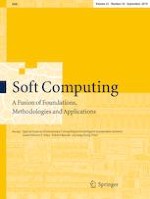30-08-2018 | Methodologies and Application
Dual hesitant fuzzy matrix games: based on new similarity measure
Published in: Soft Computing | Issue 18/2019
Log inActivate our intelligent search to find suitable subject content or patents.
Select sections of text to find matching patents with Artificial Intelligence. powered by
Select sections of text to find additional relevant content using AI-assisted search. powered by
